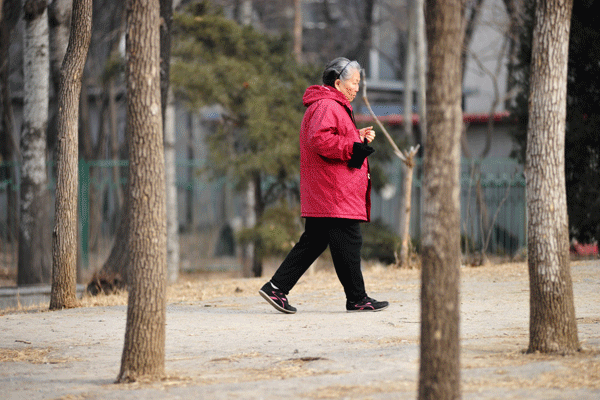 |
|
An elderly woman walks in a residential community in Beijing. [Photo/IC] |
A new plan calls for employers in Beijing to give staff more time off to show filial piety to their elderly relatives as the government aims to build a senior-friendly city. This is the first time that the capital has proposed such leave, reported Beijing News on Wednesday.
According to a plan passed by Beijing policymakers recently on improving seniors' lives in the 13th Five-Year Plan period (2016-2020), employers of the city are encouraged to grant staff vacation to visit their elderly family members on their birthdays or on Chongyang Festival, a festival for senior citizens, or when their senior relatives are in need of rehabilitative service or terminal care.
The plan did not specify how to calculate the salary during the leave or how the leave be used.
The idea of family leave to see a spouse or parents living in other places has been put forward in China for decades, but due to various reasons, it is seldom used.
According to a regulation issued by the State Council in 1981, employees of government departments or public institutions are entitled to a 24-day family leave every four years if they do not live in the same place with their spouse or parents.
A survey conducted by the Beijing News shows that among 20 respondents working at government departments or public institutions, only five have taken family leave, with eight having never heard of the policy.
The report said that income is a major reason why few take advantage of the family leave. According to the 1981 regulation, an employee who takes the family leave can?still receive their basic wage, but their performance pay will be affected.
According to statistics published by the National Health and Family Planning Commission in 2015, half the senior population in China, or more than 100 million people, are empty nesters, that is, people aged 60 or older whose children have left home.
As the country is facing increasing difficulty in caring for its aging population, it becomes an urgent task to carry out the family leave policy, Feng Xiliang with the School of Labor Economics in Capital University of Economics and Business told Beijing News.
Previously, the country had written "visiting parents" in its law books.
At the end of 2012, China's national legislature amended its law on elderly to require that adult children should visit their aging parents "often", or risk being sued by their parents.
